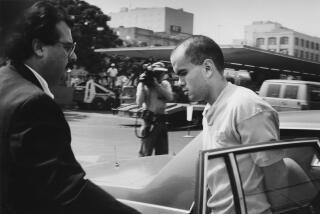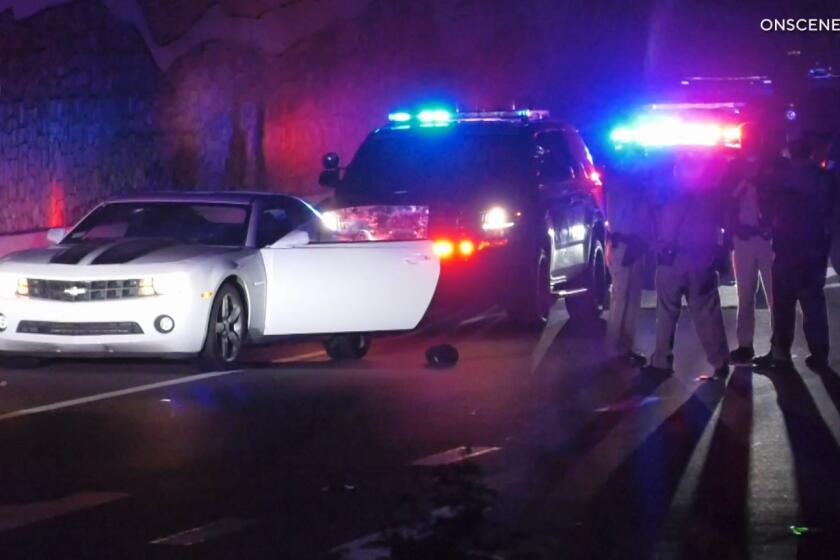Hunter to Remain in Jail; New Trial Is Ordered : Courts: A federal judge has moved up sentencing to February. Until then, the former Del Mar mayor, considered a flight risk, will remain behind bars.
Nancy Hoover Hunter, sent to jail without bail after being convicted of four counts of tax evasion, will remain in custody pending her formal sentencing next year, a San Diego federal judge ruled Tuesday.
U.S. District Judge Earl B. Gilliam, who presided over Hunter’s eight-month trial on 197 counts of federal tax evasion and fraud, affirmed his order directing her to await sentencing in jail, reiterating that he is concerned Hunter might flee.
However, the judge moved the date of Hunter’s sentencing up two months, to Feb. 20 instead of next April. He also ordered that Hunter face a new trial beginning that same day on the 192 counts that are central to the case against her but that stymied jurors despite 15 days of deliberations.
“It appears (Hunter) lived in a tinsel world, a make-believe world, for a number of years,” Gilliam said. “Slowly, that world is being taken apart.”
Hunter, 51, a former Del Mar mayor, wore a stained jail-issue khaki jumpsuit and frequently dabbed at her tears with tissues while she took notes at the 90-minute hearing Tuesday.
Hunter faces as much as 20 years in prison, or five years on each of the four counts of tax evasion.
The case against Hunter stemmed from her role as a top executive in the La Jolla investment firm J. David & Co. from 1979 to 1984, when its checks began to bounce and nervous investors forced the firm into bankruptcy.
In all, investors lost about $80 million in the J. David affair, a giant Ponzi scheme in which prosecutors alleged that Hunter played an active role.
The jury found Hunter guilty of tax evasion in connection with her personal tax returns for the years 1980 through 1983. It acquitted her of aiding and abetting in the filing of a false J. David partnership return in 1980.
The 192 other counts, primarily conspiracy and fraud, involved Hunter’s purported involvement with the Ponzi scheme. Prosecutors charged that Hunter created false documents both to lure investors to J. David and then to lull them into staying put while the firm headed toward bankruptcy.
Those 192 were the counts on which the jury deadlocked.
Immediately after Monday’s jury verdict, Gilliam sent Hunter, who had been free on $100,000 bail, to the federal Metropolitan Correctional Center to await sentencing, which he originally set for April 16. In making that decision, he said he thought she was a flight risk, citing evidence in the case of her ability to travel around the world and to “live comfortably.”
At Tuesday’s session, defense lawyer Robert Brewer tried to negotiate an arrangement under which Hunter could be released.
The judge could raise Hunter’s bail, require her to wear an electronic monitoring device or make her check in twice a day with the court, Brewer suggested.
Hunter, Brewer said, had shown up for every court appearance since she was indicted in November, 1986.
But Assistant U.S. Atty. S. Gay Hugo, the lead prosecutor in the case, reminded Gilliam, as she had Monday, that Hunter’s family has considerable wealth. Producing a list of the family’s property holdings, she said that Kenneth Hunter owns 26 properties worth millions of dollars.
A 20-year prison term would keep Hunter in jail for most of the rest of her life, Hugo said. And, because “money was no object” to Hunter or her family, she could easily flee to another country without giving up her family or her life style, Hugo said.
Gilliam, as he had Monday, sided with Hugo, saying Hunter had not shown in a “clear and convincing” way, as the law requires, that she would not flee. He ordered her returned to the Metropolitan Correctional Center but, because of that decision to keep her in jail, moved up the sentencing hearing, to Feb. 20 from April 16.
Brewer said he planned an immediate appeal of the judge’s decision to the 9th U.S. Circuit Court of Appeals.
More to Read
Start your day right
Sign up for Essential California for news, features and recommendations from the L.A. Times and beyond in your inbox six days a week.
You may occasionally receive promotional content from the Los Angeles Times.






